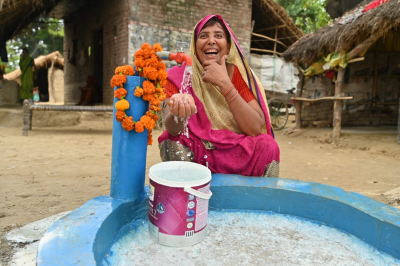Jal Jeevan Mission hits hurdles: Contamination, fund delays and staff crunch
By IANS | Updated: July 24, 2025 16:44 IST2025-07-24T16:37:10+5:302025-07-24T16:44:29+5:30
New Delhi, July 24 As India aims to provide clean drinking water across rural India, several obstacles remain, ...

Jal Jeevan Mission hits hurdles: Contamination, fund delays and staff crunch
New Delhi, July 24 As India aims to provide clean drinking water across rural India, several obstacles remain, including water scarcity in drought-prone and desert regions, geo-genic contamination of groundwater, scattered rural habitations, lack of technical manpower, and delays in fund disbursement and statutory clearances.
Rising material costs have further impacted project timelines.
The information was shared by Minister of State for Jal Shakti, V. Somanna, in a written reply to the Lok Sabha on Thursday. Notably, the Central government has extended the ambitious ‘Jal Jeevan Mission (JJM) – Har Ghar Jal’ until 2028, aiming for 100 per cent tap water coverage in every rural household.
The announcement came in light of persistent implementation challenges and the need for infrastructure sustainability. Launched in August 2019, JJM has made significant strides, increasing tap water coverage from 3.23 crore (16.7 per cent) to over 15.67 crore rural households – marking a national coverage of 80.94 per cent as of July 21, 2025.
In her Union Budget 2025-26 speech, Finance Minister Nirmala Sitharaman announced the extension with an enhanced financial outlay, currently under government consideration. The goal now focuses not just on coverage but also on the long-term operation, maintenance, and quality of rural piped water infrastructure.
To tackle these issues, the government has initiated multiple steps, including interest-free capital investment loans to states, appointment of nodal officers to ease inter-departmental coordination, and establishment of state and District Programme Management Units (SPMUs & DPMUs).
The ‘Nal Jal Mitra Programme’ is also being implemented to train local youth in technical aspects of water management.
Additionally, the Jal Shakti Abhiyan: Catch the Rain campaign continues to encourage community-led conservation efforts, with recent themes focusing on women’s empowerment and local action for source sustainability.
Disclaimer: This post has been auto-published from an agency feed without any modifications to the text and has not been reviewed by an editor
Open in app